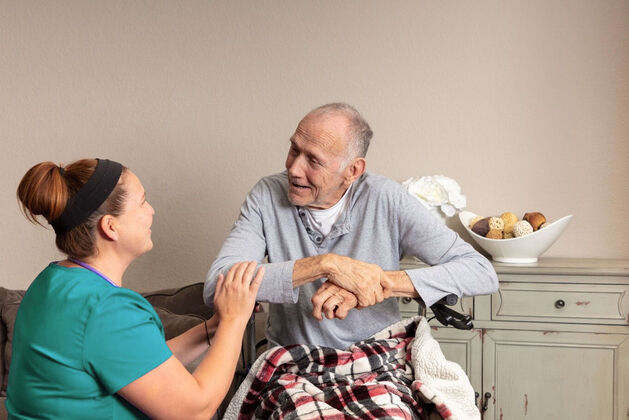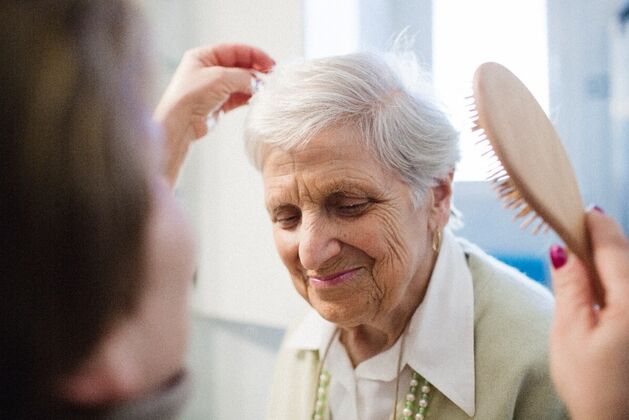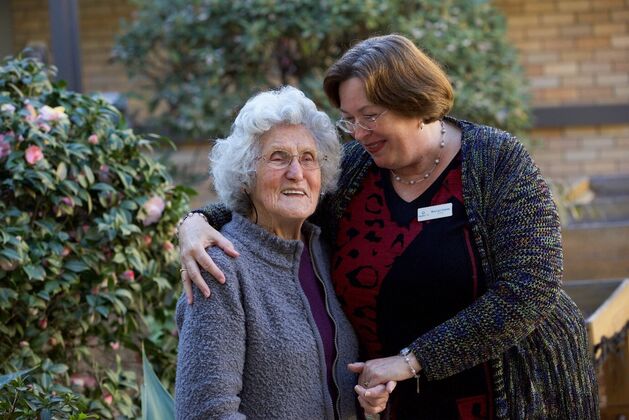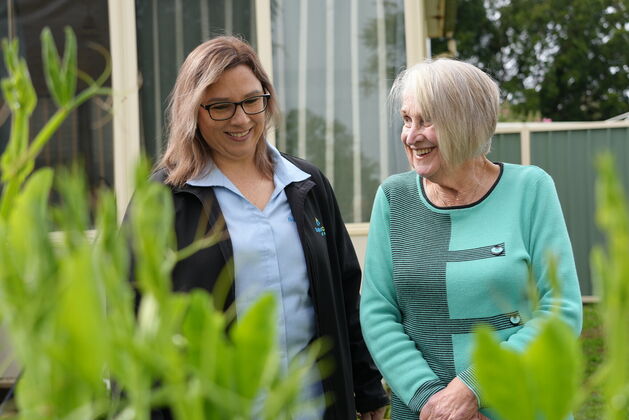Palliative Care at home
Every person’s experience is different. By listening to your needs, we can provide a personalised care program at your home. For family, and those in a caring role.
Scroll to Explore

In our modern world, few topics are still considered “taboo”. Yet death and palliative care appear to be among the handful remaining. Palliative care may not be the subject of everyday chit chat, and often, it can be a sensitive, painful topic to discuss. But in bringing this important topic to light, we gain a deeper understanding of something which could greatly benefit us all as we experience or support someone through the end-of-life stages.
What is palliative care at home?
Palliative care supports people with a life-limiting or terminal illness to live their lives as actively and as comfortably as possible
At BapistCare, our palliative care teams focus on managing the person’s symptoms and pain. We spend a lot of time with the family, providing emotional support and respite.
And while palliative care is often associated with a hospital or hospice setting, it can also be delivered in the comfort of your own home.

Choosing to stay at home
With the right supports in place, many people prefer to stay in familiar surroundings with their family nearby.
A BaptistCare client located in greater western Sydney, Monica and her daughter Sue, chose palliative care support at home through their local care team.
Monica had been living with Lewy Body Dementia since she was 65 years old and reached out to BaptistCare in 2019 when the disease significantly worsened. Sue had given up work to become a full-time carer for her mum at home and was also seeking additional support.
Monica had a Level 4 Home Care Package. That meant that she and her family were able to access our support services, subsidised by the Government. We partnered with her daughter, Sue, to create a personalised Advance Care Plan for Monica, based on her preferences and choices.”
“Our role as palliative home care workers is about providing family-centred care - listening to the client, their family, and understanding their particular needs” – Elaine Demelo, BaptistCare Palliative Care Facilitator.
Alongside visiting hospital staff, Elaine and other BaptistCare at home care workers were part of a close-knit team, providing care and support to Monica and her family during the last few years of her life. Monica passed away peacefully at home in December 2022.
What are the benefits of palliative care at home?
Palliative care can create a peaceful, nurturing, and safe environment for a person to spend their last weeks of life. But it can also have benefits long before this end-of-life phase arrives.
“Palliative care can help someone in their final stages of life to cope - and be in a space that is safe and comfortable for them - throughout this period.”
We care and support the family during the period between diagnosis and death, however long this may be. It might be weeks or years. Palliative care can have a big impact on a person’s physical, emotional, and spiritual well-being as they come to acceptance. It helps them and their family to cope throughout this period.

The features of palliative care include:
- Providing advice and assistance with pain relief medication, such as the use of opioids, which can make symptoms easier to manage and less distressing
- Partnering with the person and their family to relieve fatigue, lack of appetite, coughing, and shortness of breath
- Assisting with feeding, washing, toileting, and pressure management to minimise of pressure injuries
- Enhancing quality of life and empowering the person to remain active and independent for as long as possible
- Support to meet cultural obligations
- Providing emotional and spiritual care to the person and their family, for example, through chaplaincy care
- Providing respite care so that primary caregivers can take regular time out to rest
- Offering support to family members after their loved one has passed away.
Respite for caregivers
“Caring full-time for a loved one who is dying can be both beautiful and exhausting,” says Elaine. “It’s important to take regular time out to rest and recover so that you can continue to provide the best possible care for your loved one.”
As the primary caregiver for her mum, Clair needed to ensure she also took care of herself to provide the level of care her mum needed. When Barbara was well enough, she enjoyed a day of stimulating, fun activities at her local BaptistCare Social Club allowing Clair time to recuperate.
Throughout her illness, Barbara also enjoyed regular stays at the beautiful Wilmette Cottage, one of several BaptistCare overnight respite centres located across NSW.
“Our team’s regular home visits provided respite for Clair, too,” reflects Elaine. “She could do the gocery shopping or attend her own appointments. Sometimes, we’d just have a cup of tea together and a chat.”
When should I start palliative care at home?
Palliative care can be accessed any time after the diagnosis of a life limiting or terminal illness.
It’s often better to access palliative care services earlier, it means that the person’s pain relief and symptoms can be managed well from the start.
It also means we can build a close, trusting relationship with the person and their family. Particularly for caregivers, receiving that support early on means that they are less likely to become exhausted and burn out.

How long is the palliative process ?
Just like birth, everyone’s end of life experience is unique. Although there are recognisable signs of progression, the palliative process - and the time it takes - can differ from person to person.
“Someone can be palliative for a long period, but signs that they may be approaching the end of their life, such as drowsiness or changes in their appetite or breathing, often become more prevalent.
How to prepare for palliative care at home
When it comes to preparing for palliative home care, Elaine says education and planning are key.
Having a basic understanding of the end-of-life process, the challenges and how to address them, as well as a carefully thought-out plan, will make for a smoother and more peaceful experience for everyone.
There are several practical steps you can take to help prepare yourself and your loved one:
- Build your village
Call in your own support network of friends and family to help in any way they can – even if it means doing a grocery shop for you once a week. Taking care of someone at home can be isolating, but a caring group of people around you and regularly planned breaks will help.
- Build your care team
Get in touch with an experienced care provider such as BaptistCare, and seek advice on engaging a team of professionals to support your physical, social and emotional care at home. Consider whether you would like to incorporate spiritual care – a chaplain can support you regardless of your beliefs, and however you express your spirituality. - Build your plan
Drawing on advice from your palliative care workers and health professionals, it is a good idea to create an Advance Care Plan (ACP), which records your preferences for future care needs. This means considering who would make decisions for you if you could no longer do so yourself. As part of this, you might also consider appointing an Enduring Guardian - Build your knowledge
Take time to learn about recognisable stages in the palliative process - a good understanding of these will make them less distressing. Your palliative care workers can help explain these to you in detail and answer any questions you may have.
If you are at the beginning of your or your loved one’s palliative care journey, our team are here to help you.
End-of-Life Pathway
If you or someone you love is approaching the end of life, BaptistCare’s End-of-Life Pathway offers compassionate, personalised support to help you navigate this important stage with dignity and peace of mind. Our experienced team can guide you through care options, connect you with the right services, and ensure your wishes are understood and respected.
Whether you need help coordinating care, accessing community supports, or planning ahead, we’re here to walk beside you and your family every step of the way.
Learn more about our End-of-Life Pathway and how we can support you to live well, your way.

Final Footprints
The Final Footprints program is an end-of-life coordination service that provides personalised support focused on education, advocacy and connection to services for people with a life-limiting illness living in the Newcastle, Lake Macquarie and the Central Coast regions of NSW.

Make an enquiry
If you would like to know more, please complete the form and one of our home care specialists will be in touch.